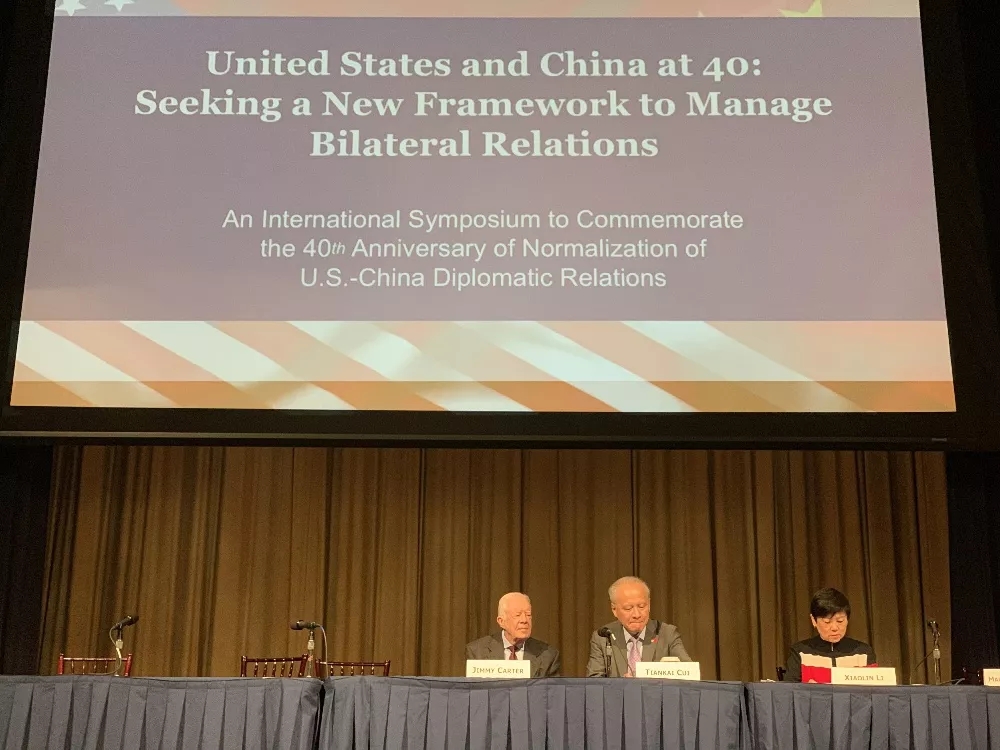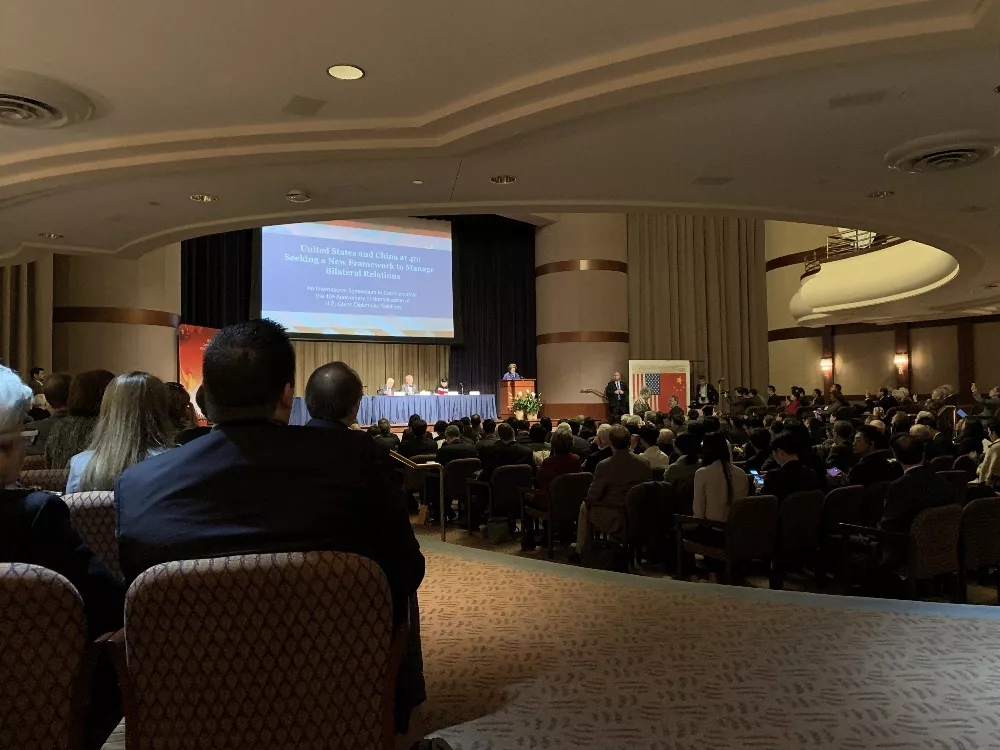Picture
Your Present Location: HOME> PictureSymposium to commemorate 40th Anniversary of establishment of China-US relations held in Atlanta
On January 17-19, hosted by the Carter Center of the United States, the Chinese People's Association for Friendship with Foreign Countries, the Chinese Academy of Social Sciences, and in collaboration with the Academy of Contemporary China and World Studies under the China Foreign Languages Publishing Administration, Chongyang Institute for Financial Studies at Renmin University of China (RDCY), and other institutions, an International Symposium to commemorate the 40th Anniversary of establishment of China-US diplomatic relations was held in Atlanta, US, with the theme of "United States and China at 40: Seeking a New Framework to Manage Bilateral Relations".

over 300 leading scholars, experts and veterans of statecraft from both countries attended the Symposium and Dozens of well-known scholars and think tank experts delivered speeches. Former U.S. President Jimmy Carter, Chinese Ambassador to the United States Cui Tiankai, and president of the Chinese People's Association for Friendship with Foreign Countries Li Xiaolin made remarks at the opening ceremony on the 18th.
The 40-year-long diplomatic relationship between the United States and China has contributed to peace, stability and prosperity of both countries and beyond, former U.S. President Jimmy Carter said.
In late 1978, Carter and then Chinese leader Deng Xiaoping reached the historic decision to establish the full diplomatic relationship between the United States and China on Jan. 1, 1979, laying the foundation for the rapid growth of bilateral relations.
"At this moment, my heart is filled with thanksgiving to Deng Xiaoping, who had the wisdom, strength, and confidence in the Chinese people ... (and) decided to build the relationship between the U.S. and China," the former president said during a symposium at the Carter Center to commemorate the 40th anniversary of U.S.-China diplomatic relations.
Carter's breakthrough with China was also one of the major foreign policy accomplishments of his presidency from 1977 to 1981.
Carter pointed out that since 1979, peace and stability have prevailed in East Asia, the hotbed of conflicts and wars for long, and that both China and the United States have been blessed with economic growth.
The 94-year-old said that both countries could realize further cooperation in areas such as the denuclearization of the Korean Peninsular and the blossoming of less-developed countries.
Many African and Latin American countries, Carter noted, would like to see the United States and China cooperate in harmony to address their economic and social challenges, instead of choosing between the two countries.
Chinese Ambassador to the United States Cui Tiankai said during the event that the entire region and the world have benefited enormously from the bilateral relationship.
"If we compare the past 40 years to a test, then we have delivered impressive scores to both our peoples and the world," said the ambassador. "Let's work even harder to get another A-plus on our score report."
Cui said that it has never been so important for China and the United States to work together in a world undergoing tremendous changes.
"The people of our two countries and the whole world are looking to us to do more for the shared interests of mankind," he added.
Echoing Carter and Cui, Susan Thornton, former acting assistant secretary of state for East Asian and Pacific Affairs, depicted the U.S.-China relationship as the most consequential relationship in the world.
The long-term peace, stability and prosperity depend on continued ability to navigate differences and find common ground between the two countries, said Thornton.
In her speech, she also refuted strategies to contain China or calling for a decoupling of the two countries, saying they are "hyperbolic and a huge waste of time."
The United States and China could work out a satisfactory outcome that will allow us to continue a productive relationship that will pay dividends to both countries and the world for the next 40 years and beyond, she said.

After the opening ceremony, Zhou Mingwei, Former President of China International Publishing Group, delivered a keynote speech noting that the current Sino-US relations are in an extremely important and difficult transition period and both sides need to embrace a global perspective to examine the the importance of cooperative and stable Sino-US relations to the world.
At the session of luncheon speech on the 19th, Professor David Shambaugh of George Washington University and Wang Wen, Executive Dean of RDCY, delivered speeches, chaired by Dr. Yu Yunquan, Deputy Director General, Academy of Contemporary China and World Studies.
At his speech, Wang Wen gave detailed historical data to prove that it is precisely the Sino-US cooperation that has caused the economic recovery of the United States, not the confrontation or competition between the two countries. With reference to this historical law, if the United States wants to achieve the goal of "Make America Great Again", it must actively promote cooperation with China. His opinion received enthusiastic responses from the US political leaders and experts attending the meeting.
In addition, Wang Peng, associate research fellow of the RDCY, made a speech at the seminar with the theme "Young Scholars and Sino-US Relations" on the afternoon of the 17th, and conducted in-depth discussion with the US guests on the relevant issues.
Ambassador Cui: China taking advantage of the US? It's a myth!
Summit held in US commemorating 40th Anniversary of normalization of Sino-US ties























































































 京公网安备 11010802037854号
京公网安备 11010802037854号





